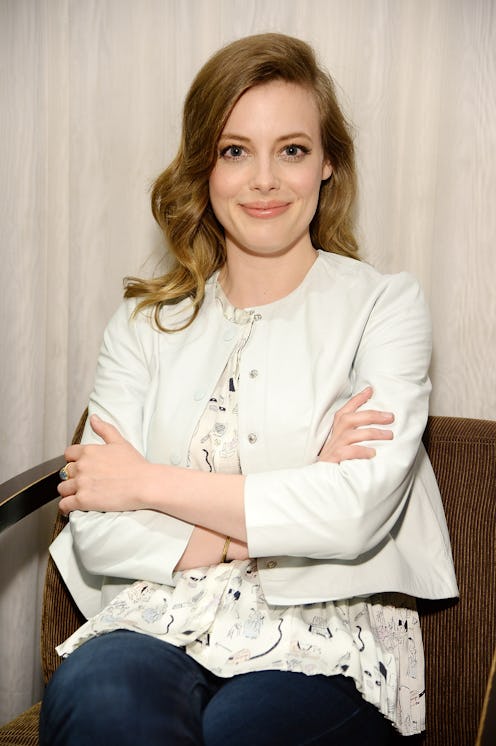Entertainment
Gillian Jacobs Embodies The Evolution Of TV
Gillian Jacobs has been in the acting game a while. When she first burst onto our screens way back in 2009 via her stint as lovable activist Britta in Community , she embodied the role with equal parts warmth and humor. Since then, she's lit up our (LBR, laptop) screens in an array of roles that have pushed the boundaries as to how women on television appear. She's never been one to shy away from roles that make her seem ridiculous, and that's potentially why Jacobs comes across as so sympathetic. In an interview with Vulture about her recent film, Don't Think Twice, Jacobs talks about progressive television, specifically how far television has come since she began training as an actor. And she's the perfect person to talk about this, because of how often she herself pushes the envelope.
When the interviewer asks her if she's been seeing more parts typical of the ones she's been playing — of women "allowed to explore their neuroses and problems" onscreen — Jacobs' answer is considered but critical of the parts she was forced to play early on in her career. "With the three-dimensionality that male characters always had? Yeah, I think I am, and it’s great that Mike wrote a female part like that. Love certainly, yes, and Mimi-Rose on Girls. I’m trying to think of what I started my career playing. Very heavy dramas, humorless dramas." You know, like the one episode of Law And Order she starred in.
When the interviewer pushes her on how it feels to be in the "post-Manic Pixie Dream Girl era," Jacobs responds:
Yes, hopefully. I feel like thankfully that term and concept is so well-known at this point that people are shying away from writing them as much. I’m not seeing as many of those. It just doesn’t pass the smell test. Also, it’s like, being an actress is somewhat making choices and then somewhat just trying to do what you’re offered.
And maybe this is the joy of Jacobs' performances. While she often opts for weird girl roles — whether Mimi Rose in Girls or Mickey in Love — these characters are just that. They're characters, not caricatures. Sure, they're often troubled or flawed, but they have depth. And, most importantly, they're neither good nor bad, just like real women. The most interesting example of this is Love, which initially seems like it's going to follow a classic Manic Pixie Dream Girl meets kind-of-boring dude narrative arc. We meet quirky, pretty Mickey and staid, reliable Gus.
But instead of Gus being charmed and delighted by Mickey's issues with poor impulse control, he's both annoyed and driven away by them. As we get further into the show, we realize Mickey's spontaneity isn't cute, but derives from her issues with substance and sex addiction. The show takes pleasure in showing how troubled the ostensibly magical Manic Pixie Dream Girl is. This is probably best encapsulated in the scene when Mickey catches Gus flirting with another girl at a party and throws herself fully-clothed off the roof of the house into a swimming pool in retaliation. When she gets to the surface, she bursts into tears: the impact hurt. Her spontaneity doesn't look appealing; it looks exhausting.
Besides which, we're prompted as viewers to react in a complex way to her. When Gus sees her weeping, he swims over to carry her to the side, abandoning the woman he's been flirting with, who has a straightforward, healthy reaction to him. While Mickey has rejected him earlier, this girl sees he's interested in her, and she's interested back. We feel sorry for Mickey, but we can't help but resent that her manipulations have worked: she's had the desired effect she won't admit to, separating Gus from the blonde.
This is great, because it's like life. Who likes anyone they're close to — family, lovers, friends — all the time? Part of intimacy is discovering and coming to terms with someone's more difficult qualities. And we see this time and again with Jacobs' roles. While Britta in Community is initially presented to us as a sexy hipster who popular guy Jeff is desperate to bed, we discover she's insecure and lacks self-awareness. It's the same story with Mimi Rose in Girls. We first see her through Hannah's eyes: as her flawless, creatively-fulfilled love rival. But, when we see how borderline manipulative she is, we're forced to realize that she's not perfect, but human. Just like Hannah.
If you like meaty, nuanced roles for women in TV, look to Gillian Jacobs' choices. Sure — it's not just Jacobs, but is part and parcel of television getting smarter and less adherent to strict genre boundaries as a whole. But, you've got to admit, she brings essential charisma to characters which are both lovable and frustrating all at once. So, while you're kicking back this evening, enjoying some Golden Era of Television shows, make sure you raise a glass to Gillian Jacobs, television pioneer.
Images: Netflix (2); Giphy
